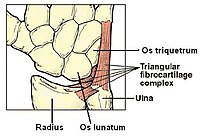
Photo from wikipedia
Background: This study aimed to investigate the relationship between the presence and degree of cervical intervertebral disc degeneration (IVDD) and the cervical region muscle areas. Methods: The magnetic resonance imaging… Click to show full abstract
Background: This study aimed to investigate the relationship between the presence and degree of cervical intervertebral disc degeneration (IVDD) and the cervical region muscle areas. Methods: The magnetic resonance imaging (MRI) examination of the patients who were sent to our clinic for investigation of neck pain between 2019 and 2020 years were evaluated retrospectively. 143 Turkish women patients between 30 and 40 ages were examined in the study. The presence and degree of IVDD was evaluated for each patient. The areas of the cervical flexor and extensor paravertebral muscles were measured. Results: No cervical disc degeneration was present in 44 (30.76%) patients (grade 1). The cervical intervertebral disc degeneration was grade 2 in 28 (19.58%), grade-3 in 41 (28.67%), and grade 4 in 30 (20.97%) patients. In early stage degeneration (grade 2), an increase was observed in the area of all cervical paravertebral flexor and extensor muscles examined. As the degree of degeneration increased (grades 3 and 4), a decrease was observed in the areas of all muscles. Statistical significance was found for musculus (m) sternocleidomastoideus, m. levator scapulae, m. splenius capitis, m. semispinalis capitis, and m. multifidus muscles (P = .009, r = −0.261; P = .014, r = −0.248; P = .008, r = −0.267; P = .002, r = −0.307; P = .028, r = −0.222, respectively). Conclusions: IVDD is common in middle-aged females with neck pain. An increase in muscles areas is observed in the early stages of cervical disc degeneration but progressive decrease develops in all cervical paraspinal muscles areas as the degree of disc degeneration increases.
Journal Title: Medicine
Year Published: 2022
Link to full text (if available)
Share on Social Media: Sign Up to like & get
recommendations!